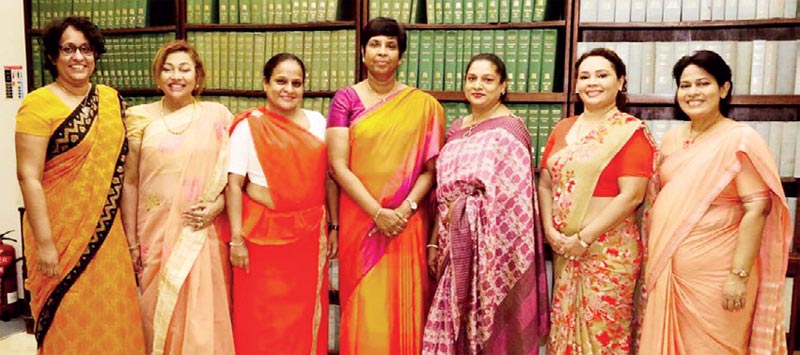Monday Feb 16, 2026
Monday Feb 16, 2026
Friday, 26 November 2021 03:12 - - {{hitsCtrl.values.hits}}

The Parliament of Sri Lanka yesterday stood in solidarity with the global movement and united with the global theme as women MPs wore orange colour sarees to the House as an initiative by the Select Committee.
“Gender based violence (GBV) has almost become a clichéd term in gender terminology. We have spoken about it over and over again, it has really lost its essence. But, it is not merely a term. It is an utterly bitter reality in the world and in Sri Lanka,” said State Minister of COVID-19 Control, Primary Healthcare and Epidemics Dr. Sudarshini Fernandopulle.
Statistics can only tell a half-truth, but it is worth looking at a few statistics. The Women and Wellbeing Survey 2019 which is the first dedicated national survey on Violence against Women (VAW) in Sri Lanka reports that one in four Sri Lankan women has experienced some kind of physical or sexual violence. Close to 40% of women have undergone physical, sexual, emotional and/or economic violence and/or controlling behaviours by a partner.
The survey underscores that the conditions of violence against women in the estate sector are really grim. The report also confirms that physical and sexual violence was mostly overlapping and repeated more than one time.
65% of the women who were forced to have sexual intercourse, for instance, reported that they went through this violence two to three times and 32% reported that they were forced to have sex over five times. Intimate partners were reported to be inducing physical violence than non-partners.
Long-term physical and mental health impacts were prominently reported in the women who suffered VAW. Close to 30% of the victims reported to have suffered from persistent injury due to sexual and physical violence and close to 20% reported that the injuries required medical care. Close to half of the victims who suffered sexual violence by a partner rated the impact of the violence they face was “a lot” while another 30% rated it to be “a little”.
COVID-19 only aggravated the levels of sexual and physical violence against women in Sri Lankan and across the world, as was repeatedly reported in news.
A special Select Committee on Gender Equity and Equality is set up by the Parliament of Sri Lanka specifically to look into GBV too and make recommendations to Parliament to ensure gender equity and equality with special emphasis on looking into gender-based discriminations and violations of women’s rights in Sri Lanka. The committee headed by Fernandopulle works hand-in-hand with the Legislature and the Executive to alleviate gender inequities and inequalities using their representative and oversight mandates.
As the world marked the 16 Days of Activism against Gender-based Violence from 25 November, the International Day for the Elimination of Violence against Women, to 10th December, the Human Rights Day this year too, the UN Secretary-General’s UNiTE campaign has declared the global theme of this year as “Orange the World: End Violence against Women Now!”
Emphasising the forms of violence women have to face in the informal sector, Diana Gamage, a member of the Select Committee, stated in the Parliament on 11 November: “Due to the discrimination that women have to undergo, they tend to end up in insecure jobs. They have to face a lot of harassment due to discrimination. It could be sexual harassment, mental harassment and in some cases, physical harassment. So, that needs to be changed.”
Eran Wickramaratne, who is a member of the Select Committee and a Gender and Inclusion Champion, remarked: “It is high time that we as a society treat women and all human beings with respect! GBV is all over the world. But it should not be normalised as an unavoidable phenomenon. We need attitudinal change in people.
“Women are not there to be at the receiving end of the wrath and frustration of the powerful! Women are not victims! Today most women contribute to the family finances. Even if not, women have been playing a crucial role in families and societies. We as a country, a nation should be ashamed of the facts and figures reported. We must do our best to prevent GBV in all forms.”
Rohini Kumari Kaviratne, who is a strong voice in the Parliament of Sri Lanka against gender inequalities and is the Vice Chairperson of the Women Parliamentarians’ Caucus, stated: “Women, whether it’s a Parliamentarian or a housewife, must be respected by everyone in society! That is what we strive for as the Women Parliamentarians› Caucus and the Select Committee.
“I urge the support of my fellow Parliamentarians and the whole of the society to stand against shameless acts and speeches of people who violate the rights of women, especially in different forms of violence against women.»
“What we do as the parliament of Sri Lanka today is not just a tokenistic measure. Rather, it is to awaken the society that every individual has a responsibility to stand against GBV and VAW,” remarked Fernandopulle, emphasising the need to eliminate GBV in this small island nation and beyond.